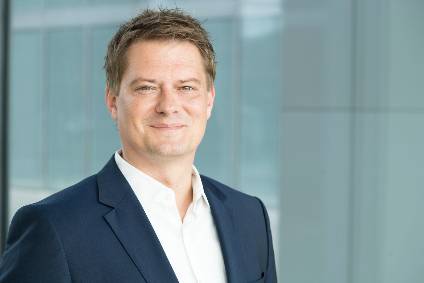
BMW, Daimler, Ford and the Volkswagen Group are involved in a joint venture, called Ionity that is installing a high power charging network for electric vehicles across Europe. The venture is based in BMW’s home city of Munich and headed by CEO Dr Michael Hajesch. Continuing just-auto/QUBE’s series of interviews, we spoke to Dr Hajesch to find out more.
Could you tell us a little more about your business?

Discover B2B Marketing That Performs
Combine business intelligence and editorial excellence to reach engaged professionals across 36 leading media platforms.
Ionity was formed in November 2017 as a joint venture between BMW Group, Daimler AG, Ford Motor Company and the Volkswagen Group with Audi and Porsche to build a pan-European High-Power Charging (HPC) Network for electric vehicles to make long distance e-mobility a reality.
We currently employ just under 60 staff with offices in Munich and Oslo. At Ionity our mission is to build and operate 400 HPC stations along major European motorways in 24 countries by 2020. Each station is equipped with between 4 and 6 HPC points each capable of delivering 350kW of power thus guaranteeing that the network will be relevant for years to come. The chargers are equipped with the European standard combined charging system plug opening up the network to most manufacturers.
What stage are you at?
As of today [15 March 2019] we have 61 stations live in nine countries with a further 51 under construction. As our network is expanding rapidly, we update our website on a weekly basis. We will achieve our target of 400 by 2020.
What equipment are you installing at each station?
Our chargers are all 350kW and are supplied by ABB, Tritium and Porsche Engineering.
What’s the most challenging aspect to setting up a charging infrastructure for EVs?
There are numerous challenges! Over the last year and a half, Ionity has built up a dynamic company with talent from a diverse range of industries including, telecommunications, automotive, digital infrastructure and financial innovation. We have signed contracts with site partners in 24 countries, each of which has its own, often unique, cultural characteristics. We have over twelve nationalities within our organization and this gives us a truly European outlook on the task in hand – itself a valuable asset in challenging times.
While we don’t suffer from sleepless nights, the team is aware of the urgency of the task as our shareholders bring a new generation of BEVs to market.
Building charging infrastructure is akin to building a house, except that the house has to be built 400 times in 24 different countries. While we don’t suffer from sleepless nights, the team is aware of the urgency of the task as our shareholders bring a new generation of Battery Electric Vehicles (BEVs) to market.
We have heard that some European power companies are partnering with carmakers to develop services that allow power stored in EV batteries to be sold back to the grid. What’s your view on a case for a commercial-scale V2G network?
V2G is certainly an interesting prospect for the future. Ionity was set up to focus on building an HPC network for Europe’s motorways and we are concentrating our efforts on achieving this task.
We understand that Ionity is charging a flat-rate 8 Euros, Swiss Francs, Swedish Krona or British pounds. Is this an introductory offer price or what can we expect?
The 8 Euro session fee which will remain in place for the immediate future is an opportunity to test our systems however we are looking to introduce kWh prices this year.






